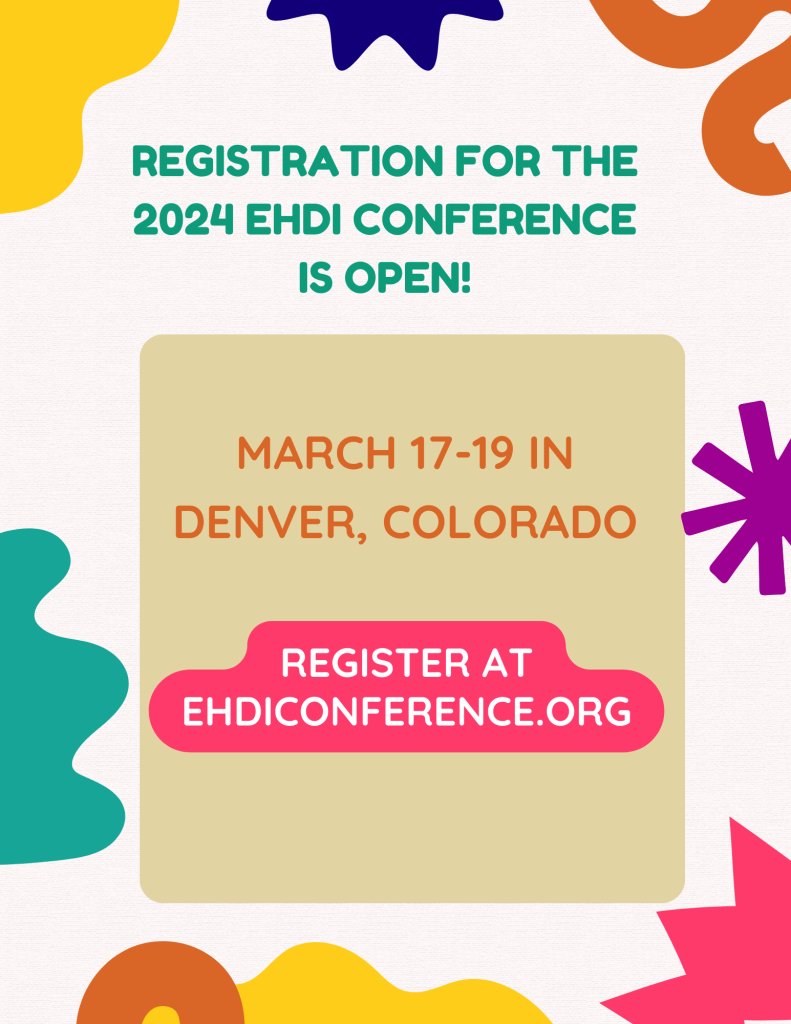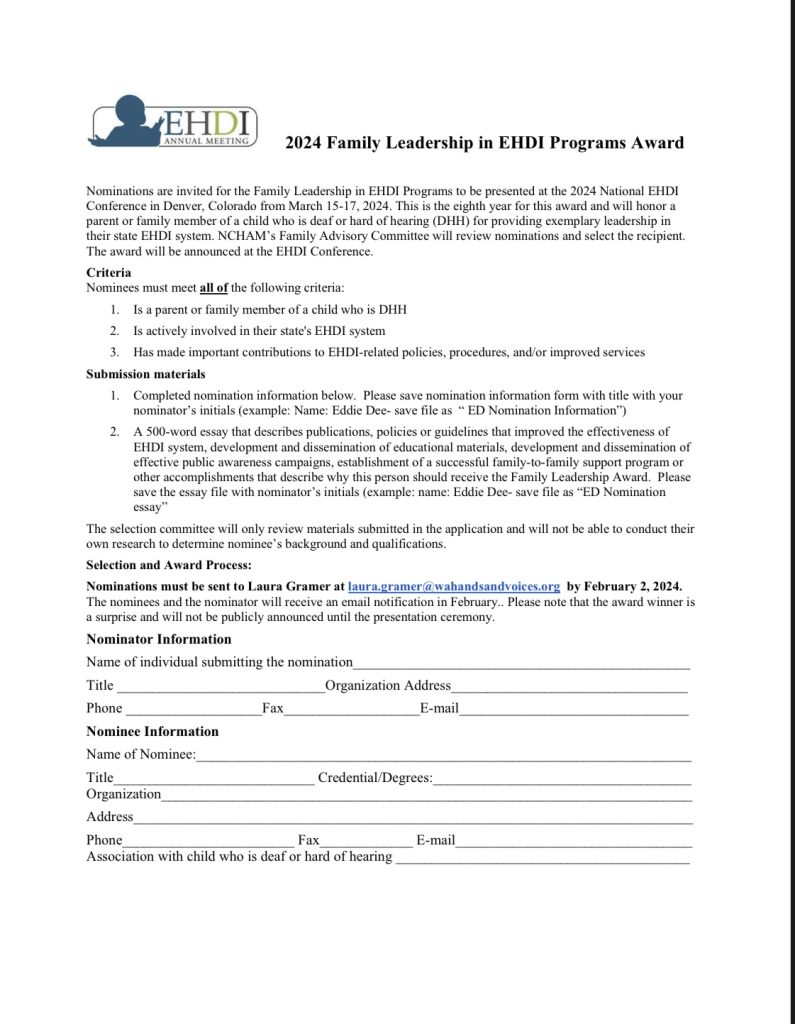
Monthly Archives: January 2024
Super cool news! A Texas author published a children’s book about the deaf community
Join us tomorrow, Jan. 17th at 12:00pm MST via Zoom for our coffee chat webinar “Diving into State Data: How the Deafblind Child Count Data Can Help You”.
Register here: https://usu.co1.qualtrics.com/jfe/form/SV_3WwtLpqGJ1U4lqS
Webinar Description:
This coffee chat will share information from the National Deafblind Child Count to highlight common etiologies & causes of deafblindness such as CHARGE syndrome, complications due to prematurity, postnatal complications, Usher syndrome, cCMV, and Down Syndrome. We will examine trends nationally over the last three years, discuss differences between birth to three and 6-21 in etiologies and identification, and share resources specific to different etiologies that may help inform your work.
Webinar Presenters:
Emma Nelson, MS Ed is the Initiative Lead for Early Identification and Referral at the National Center on Deaf-Blindness (NCDB). She is certified as an early childhood special educator and has taught infants, toddlers, and preschoolers with complex needs including deaf-blindness in classrooms, community, and home-based settings. Before coming to NCDB, she served as Project Director for Vermont’s Federal Deaf-Blind Project. Emma is trained in Cortical Visual Impairment (CVI) and earned her Master’s degree at Hunter College in Early Childhood Special Education with a concentration in severe and multiple disabilities and deaf-blindness.
Carlie Rhoads, PhD, is the Data and Evaluation Manager at the National Center on Deaf-Blindness (NCDB). She is certified as a special educator and TVI, and has taught children, birth to age 21, with complex needs including blindness and deaf-blindness. Before coming to NCDB, she served as Project Director for the Oregon Deaf-Blind Project. Carlie earned her doctorate at Vanderbilt University in Special Education with a concentration in visual disabilities and research methodology.
Nominations for the 2024 Family Leadership in EHDI Programs Award are open! See info below
Don’t Miss Out! Register Now for our EHDI Panel Discussion on Language Acquisition in Infants Identified as D/HH
February 8, 2024 | Noon – 1:00 pm CT
Join The American Academy of Pediatrics (AAP) Early Hearing Detection and Intervention (EHDI) virtual panel discussion, “From Early Identification to Intervention: How to Promote Language Acquisition for Infants Identified as D/HH.” Expert perspectives from pediatric clinicians, early interventionists, audiologists, family/caregivers, and pediatric subspecialists will inform crucial aspects of the EHDI system. This event is tailored for pediatric health clinicians, including pediatricians and family medicine practitioners, but open to all EHDI system members! Learn about EHDI partners’ roles and discover success stories in supporting language acquisition for children that are D/HH. Register now to not miss this insightful discussion! Closed captioning and an American Sign Language (ASL) interpreter will be available for accessibility.
Register at this link: https://aap.webex.com/webappng/sites/aap/meeting/register/0ba6f2f3cb7643218db7f7ceb0154cc2?ticket=4832534b000000066354a7a25d57b2f36e4813a5dfb3e50e76c95bb867d875b786f30b3b6e9ad1bb×tamp=1705089570232&RGID=rdb26576babd39d8e89611c0c91b36610

Register now for the 2024 EHDI Conference in Denver!
Registration is OPEN and you can register at this link: https://ehdiconference.org/Reg.cfm

Earworm has just released a new dialogue on hearing health you won’t be able to stop thinking about. This new episode is entitled, “How will we communicate with our child? Supporting families as they face key questions when their child is diagnosed as deaf or hard of hearing”.
This episode features a conversation with Amy Spencer who is the coordinator of early intervention and family services at the Maine Educational Center for the Deaf and Hard of Hearing. Amy will be talking about the critical decisions families of deaf or hard of hearing children face in the weeks and months after diagnosis and how health care providers, early interventionists, audiologists and others can provide meaningful support. You won’t want to miss this practical and insightful discussion.
The Earworm podcast features conversations with a wide array of professionals, family members, advocates, and scientists whose experiences, ideas, curiosities, and activities are committed to ensuring that all children who are deaf or hard-of-hearing can thrive. The Earworm podcast is available for streaming anywhere you listen to podcasts, as well as on www.earwormpodcast.org.
Previous Earworm podcasts include:
Episode 5: The Potential of Preventing the Most Common Non-Genetic Cause of Hearing Loss with a Vaccine/ Interview with Dr. Lori Panther
Episode 4: New Frontiers in Universal Hearing Screening: Genetic Screening / Interview with Dr. Eliot Shearer
Episode 3: Diagnosing Why? The importance of knowing the cause of a child’s hearing loss / with Dr. Eliot Shearer
Episode 2: Newborn Screening Isn’t Enough: A parent’s perspective on late identified hearing loss / with Valerie Abbott
Episode 1: Newborn Screening Isn’t Enough: Monitoring Hearing Status Throughout Early Childhood/ with Dr. Dylan Chan
New Episodes are released each month and feature conversations with a wide array of professionals, family members, advocates, and scientists whose experiences, ideas, curiosities, and activities are committed to ensuring that all children who are deaf or hard-of-hearing can thrive. The Earworm podcast is available for streaming anywhere you listen to podcasts, as well as on www.earwormpodcast.org.

Attention Idaho residents!
Consider attending the 2024 Professional Collaboration with
Idaho’s Early Hearing Detection and Intervention (EHDI) program and the National Center for Hearing Assessment and Management (NCHAM).
The two organizations are partnering to offer another exciting training opportunity for audiologists, speech-language pathologists, Early Interventionists, Teachers for the Deaf, Family-to-Family Support, and students in any of the above named disciplines.
Online training will be once a week beginning the week of January 15, 2024 and continuing through March 27, 2024 (60 minutes each week). This will prepare participants to fully engage during the onsite workshop. Online sessions utilize the free Moodle and Zoom platforms. In order to participate fully, you will be required to have video, audio and keyboard capabilites during all online sessions.
The in-person workshop will take place February 23-24, 2024 at a TBD location.
More information and registration details can be found here: http://events.r20.constantcontact.com/register/event?oeidk=a07ek3in8jp06015200&llr=mhicgejab

